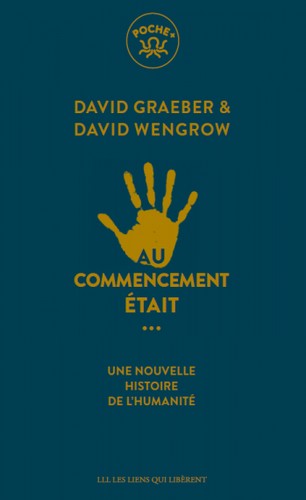Så forskjellige er vi ikke.
Dette var en interessant bok. Den var overraskende lettlest uten at jeg fant sitatvennlige avsnitt på annenhver side. Bokens store prosjekt er å skisse på en fortelling av vår fortid som skiller seg fra den vanlige eurosentriske fortellinga der man blikket man ser fortiden med er farget av det kapitalistiske samfunnet vi lever i og hva som er politisk mulig nå — og dermed gi en annen fortelling av hvem vi er (gjetter jeg).
Jeg har alt for lite bakgrunn i feltet til å bedømme om argumentene som legges fram er godt underbygde eller ikke. Det er vanskelig når man skriver om en tid som ligger så langt tilbake at man ikke har tilgang til hvordan de som levde da så på seg selv, man kan bare anta. De påpeker flere steder at andre forskere har tolket funn utifra sin egen samtid, sikkert med fare for å snuble i samme …
Dette var en interessant bok. Den var overraskende lettlest uten at jeg fant sitatvennlige avsnitt på annenhver side. Bokens store prosjekt er å skisse på en fortelling av vår fortid som skiller seg fra den vanlige eurosentriske fortellinga der man blikket man ser fortiden med er farget av det kapitalistiske samfunnet vi lever i og hva som er politisk mulig nå — og dermed gi en annen fortelling av hvem vi er (gjetter jeg).
Jeg har alt for lite bakgrunn i feltet til å bedømme om argumentene som legges fram er godt underbygde eller ikke. Det er vanskelig når man skriver om en tid som ligger så langt tilbake at man ikke har tilgang til hvordan de som levde da så på seg selv, man kan bare anta. De påpeker flere steder at andre forskere har tolket funn utifra sin egen samtid, sikkert med fare for å snuble i samme fella selv.
Noen saker jeg har lært i denne boka: * Folk før i tida var sånn omtrent som folk er nå. Folk før i tida var minst like opptatt av politikk og filosofi som vi er nå, men den kunne ta andre uttrykk. Mennesker i urtiden var mer opptatt av frihet enn likhet, men det andre var ofte en konsekvens av det første. * Jordbruksrevolusjonen for sånn omtrent 12 000 år siden var ingen revolusjon i det hele tatt. Det var en prosess som gikk ganske langsomt og som begynte med at man eksperimenterte med å så, men at man lenge levde som jegere/sankere. Det var ingenting som pekte fra det første sådde frøet til dagens industrijordbruk. * Mennesker har levd i mange forskjellige typer samfunn gjennom historien. Vi har både gått fra små samfunn til store samfunn, og fra store til små. Vi har både gått mot mer auktoritære samfunn og mot mer egalitære. Politiske strukturer har tidvis hatt mye makt, tidvis hatt begrenset makt. * Mange samfunn har vekslet mellom auktoritære og egalitære samfunn utifra årstid eller situasjon, likeså med om man lever som jegere/samlere eller jordbrukere. * Vi er på mange måter mindre frie nå enn hva vi var for både noen hundre og noen tuser år siden.
The Dawn of Everything utfordrer oss først å fremst til å drømme og diskutere hvordan vi vil at samfunnet vi lever i skal se ut, ettersom vi har dette i oss. Graeber og Wengrows blikk på fortiden, selv om også dette bilder er mangelfullt, sier i det minste: om de kunne, så kan vel vi — så forskjellige er vi ikke.





